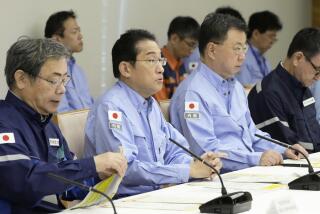Japan’s Premier Expresses Regret for WW II Actions : Asia: On anniversary of nation’s surrender, Tomiichi Murayama cites suffering inflicted on other countries.
- Share via
TOKYO — A Japanese prime minister for the first time declared Monday in an annual ceremony honoring Japan’s war dead that Japan had “inflicted tragic sacrifices beyond description upon large numbers of people in Asia and other countries.”
“I would like to humbly express my grief and deep self-reflection for the agony and sorrow of those peoples,” Prime Minister Tomiichi Murayama said in an official ceremony on the 49th anniversary of Japan’s surrender in World War II. The event was attended by 7,000 relatives of about 3.1 million Japanese killed in the war.
“We must repent for our own history and tell younger generations about the wretchedness of war and numerous precious sacrifices caused by the war,” Murayama said.
But even as he was citing the suffering Japan had caused--the first such statement ever made by a prime minister during the annual ceremony--seven members of his Cabinet visited the Shinto Yasukuni Shrine, where 14 war criminals are enshrined. Small bands of rightists protested moves to apologize for Japan’s aggression. And Emperor Akihito, speaking at the same ceremony, offered tribute only to Japanese war dead.
As a package, the day’s events pointed to a looming battle over Murayama’s plans to make 1995, the 50th anniversary of the war’s end, a year for self-reflection and apology to Japan’s victims.
In his speech, Murayama pledged to work to resolve “all postwar problems”--an indirect reference to issues such as wartime government recruitment of women to serve as prostitutes for Japanese troops; payment of postal savings and wages owed to Taiwanese who fought for Japan during the war, and repatriation of Koreans left behind on Sakhalin Island when it was turned over to Moscow’s control after the war’s end.
Murayama, Japan’s first Socialist prime minister in 46 years, also said earlier that he wants Parliament to enact a resolution of remorse to mark the anniversary. The government failed in its attempt three years ago to pass such a resolution for the 50th anniversary of Japan’s attack on Pearl Harbor.
Last year, then-Prime Minister Morihiro Hosokawa, leader of the Japan New Party, for the first time offered condolences to non-Japanese victims of the war but said nothing about suffering Japan had inflicted on others. In a news conference on Aug. 10, 1993, Hosokawa branded Japan’s actions in the war as “aggression.”
Most prominent of the seven Cabinet members who ignored a request by Murayama to refrain from visiting the Yasukuni shrine was Ryutaro Hashimoto, minister of international trade and industry, who belongs to the Liberal Democratic Party. In a book published in March, Hashimoto, who also heads the War Bereaved Assn. of relatives of the dead, criticized Hosokawa for labeling the entire war as aggression.
“I can’t think that the war with the United States, England, France and Holland was aggression,” Hashimoto wrote.
On Sunday, Environment Minister Shin Sakurai was forced to resign from the Cabinet for declaring that Japan did not go to war with the idea of committing aggression in Asia.
In May, Justice Minister Shigeto Nagano was forced to quit after declaring that the Japanese went to war to free Asian nations from Western colonialism.
On Monday, composer Toshiro Mayazumi, speaking at a rally supporting official visits to Yasukuni, reiterated that argument and declared that the Japanese should refrain from making any apologies for the war.
Sixty-eight rank-and-file members of Parliament--mostly Liberal Democrats and members of the opposition Renewal Party of former Prime Minister Tsutomu Hata--also visited the shrine, which is Japan’s nearest equivalent to Arlington National Cemetery.
Its stature as a shrine of the Shinto religion, which promoted militarism in prewar days, as well as its enshrinement of such war criminals as Prime Minister Gen. Hideki Tojo, have made it a continuing focus of controversy.
More to Read
Sign up for Essential California
The most important California stories and recommendations in your inbox every morning.
You may occasionally receive promotional content from the Los Angeles Times.











